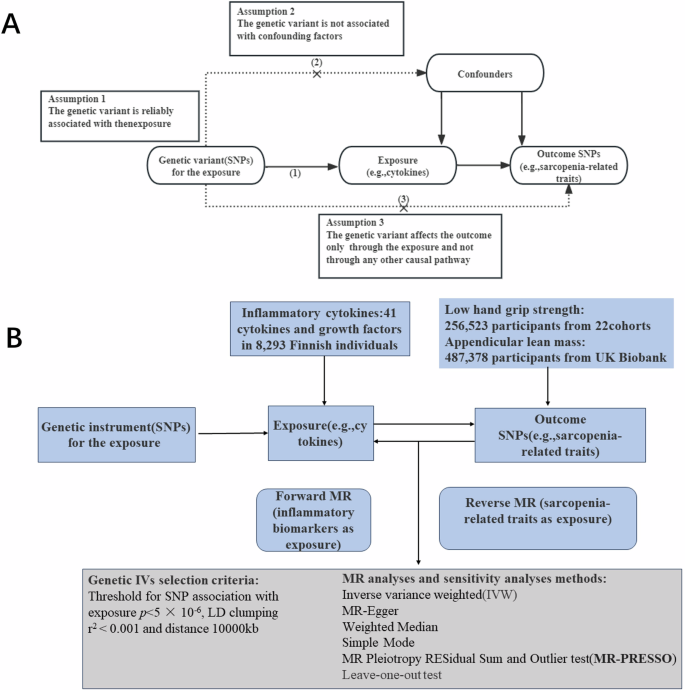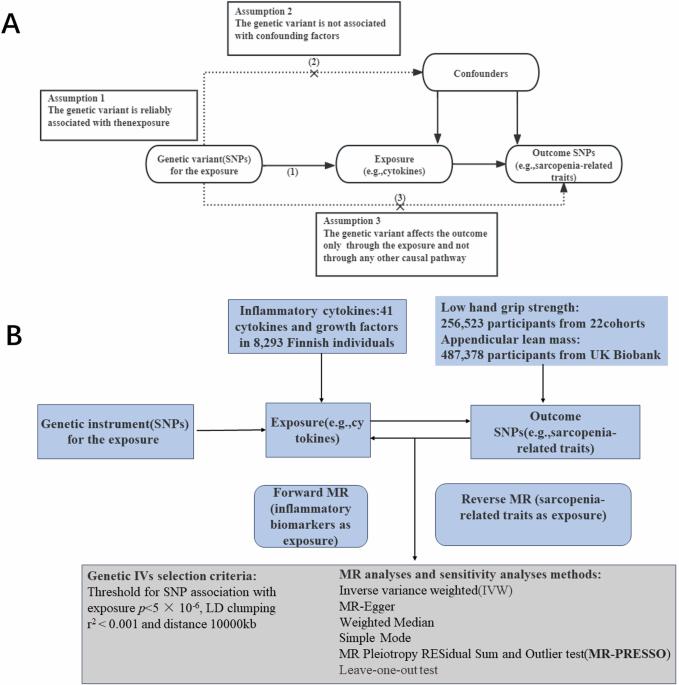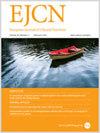The association between inflammatory cytokines and sarcopenia-related traits: a bi-directional Mendelian randomization study
IF 3.6
3区 医学
Q2 NUTRITION & DIETETICS
引用次数: 0
Abstract
Sarcopenia is among the most common musculoskeletal illnesses, yet its underlying biochemical mechanisms remain incompletely understood. Identifying the relationship of inflammatory cytokines with sarcopenia components would help understand the etiology of sarcopenia. We performed a bi-directional Mendelian randomization study to explore the causal relationship between 41 inflammatory cytokines and sarcopenia-related traits. The study was performed in two stages using bidirectional dual-sample Mendelian randomization. We obtained aggregated statistical data on inflammatory factors, low grip strength, and ALM from genome-wide association studies. To explore the causal association between exposure and outcomes, we primarily utilized the inverse variance weighted strategy. Furthermore, we conducted sensitivity analyses through the use of Mendelian randomization (MR) Egger, weighted median and simple mode methods. To evaluate robustness of the results and to identify and adjust for horizontal pleiotropy, we performed the MR Pleiotropy RESidual Sum and Outlier test, the MR Egger intercept test, and a leave-one-out analysis. The results displayed a potential association between interleukin-10 (OR: 1.046, 95% CI: 1.002–1.093, p = 0.042) and vascular endothelial growth factor (OR: 1.024, 95% CI: 1.001–1.047, p = 0.038) and the risk of low hand-grip strength. Moreover, interferon gamma-induced protein 10 (OR: 1.010, 95% CI: 1.000–1.019, p = 0.042) and macrophage colony-stimulating factor (OR: 1.010, 95% CI: 1.003–1.017, p = 0.003) were significantly linked to a higher risk of ALM. We identified a causal relationship between multiple inflammatory factors and sarcopenia-related traits. Our study offers valuable insights into innovative methods for the sarcopenia prevention and treatment by regulating inflammatory factors.


炎性细胞因子与肌肉疏松症相关特征之间的关联:一项双向孟德尔随机研究。
背景:肌肉疏松症是最常见的肌肉骨骼疾病之一,但人们对其潜在的生化机制仍知之甚少。确定炎性细胞因子与肌肉疏松症成分的关系有助于了解肌肉疏松症的病因。我们进行了一项双向孟德尔随机研究,探讨 41 种炎症细胞因子与肌肉疏松症相关特征之间的因果关系:研究采用双向双样本孟德尔随机法,分两个阶段进行。我们从全基因组关联研究中获得了有关炎症因子、低握力和ALM的综合统计数据。为了探索暴露与结果之间的因果关系,我们主要采用了反方差加权策略。此外,我们还通过使用孟德尔随机化(MR)Egger、加权中位数和简单模式方法进行了敏感性分析。为了评估结果的稳健性并识别和调整水平多向性,我们进行了MR多向性RESidual Sum和离群检验、MR Egger截距检验以及leave-one-out分析:结果显示,白细胞介素-10(OR:1.046,95% CI:1.002-1.093,P = 0.042)和血管内皮生长因子(OR:1.024,95% CI:1.001-1.047,P = 0.038)与低手握力风险之间存在潜在关联。此外,干扰素γ诱导蛋白10(OR:1.010,95% CI:1.000-1.019,p = 0.042)和巨噬细胞集落刺激因子(OR:1.010,95% CI:1.003-1.017,p = 0.003)与ALM的风险显著相关:我们发现了多种炎症因素与肌肉疏松症相关特征之间的因果关系。我们的研究为通过调节炎症因子预防和治疗肌肉疏松症的创新方法提供了宝贵的见解。
本文章由计算机程序翻译,如有差异,请以英文原文为准。
求助全文
约1分钟内获得全文
求助全文
来源期刊
CiteScore
10.60
自引率
2.10%
发文量
189
审稿时长
3-6 weeks
期刊介绍:
The European Journal of Clinical Nutrition (EJCN) is an international, peer-reviewed journal covering all aspects of human and clinical nutrition. The journal welcomes original research, reviews, case reports and brief communications based on clinical, metabolic and epidemiological studies that describe methodologies, mechanisms, associations and benefits of nutritional interventions for clinical disease and health promotion.
Topics of interest include but are not limited to:
Nutrition and Health (including climate and ecological aspects)
Metabolism & Metabolomics
Genomics and personalized strategies in nutrition
Nutrition during the early life cycle
Health issues and nutrition in the elderly
Phenotyping in clinical nutrition
Nutrition in acute and chronic diseases
The double burden of ''malnutrition'': Under-nutrition and Obesity
Prevention of Non Communicable Diseases (NCD)

 求助内容:
求助内容: 应助结果提醒方式:
应助结果提醒方式:


